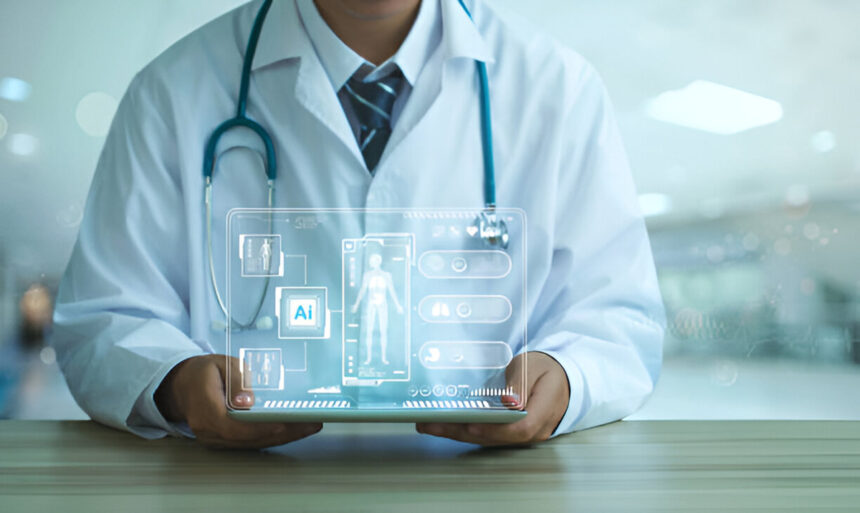Imagine a world where diagnosing a complex illness is as simple as running a computer program. This is not science fiction but the future unfolding before our eyes. Artificial Intelligence (AI) is revolutionizing medicine, offering unprecedented opportunities to enhance how we diagnose, treat, and manage diseases. Understanding AI’s role in medicine is crucial for healthcare professionals, tech enthusiasts, and anyone intrigued by health innovations. This post explores how AI is reshaping healthcare, bringing about a new era of medicine.
The Current Landscape of AI in Medicine
Defining AI in Healthcare
Artificial Intelligence in healthcare involves systems replicating human cognitive functions utilizing machine learning, natural language processing, and computer vision to interpret data and drive decision-making. Unlike traditional software, AI improves over time, making it a valuable medical tool. It’s crucial to differentiate between AI (the broad concept), machine learning (algorithms learning from data), and deep learning (neural networks for complex tasks).
The Role of Big Data in AI-driven Healthcare
Big data fuels AI’s capabilities in healthcare. Large volumes of data are gathered and examined, from electronic health records (EHRs) to genomic data and wearable technology. This data allows AI to identify patterns, make predictions, and provide once unattainable insights. For instance, EHRs offer comprehensive patient histories, genomic data uncovers genetic predispositions, and wearables track real-time health metrics, contributing to a complete understanding of patient health.
Current AI Applications in Medicine
AI’s integration into healthcare is already making waves. In diagnostics, AI aids radiologists by interpreting scans with remarkable accuracy, significantly reducing diagnostic errors. Predictive analytics are used to forecast disease outbreaks, allowing for proactive measures. Customized treatment plans designed to fit individual patient data are becoming a reality, enhancing patient outcomes. These applications demonstrate AI’s potential to transform healthcare delivery and improve patient care.
Transforming Diagnostics and Disease Detection
AI in Early Diagnosis
Early diagnosis is crucial for effective disease treatment, with AI leading the way, especially in cancer detection. AI tools in mammography and skin cancer detection identify anomalies accurately, often spotting what human eyes might miss. For example, algorithms trained to recognize specific image patterns can detect early signs of breast cancer, giving patients a better chance for successful treatment. These advancements demonstrate AI’s potential to revolutionize disease detection.
Enhancing Medical Imaging with AI
Medical imaging is a crucial area where AI excels. It interprets MRI, CT scans, and X-rays, providing insights that improve diagnostic accuracy. AI minimizes human error by analyzing images pixel by pixel, ensuring timely and accurate diagnoses. This capability is precious in emergencies, where quick decision-making is vital. AI’s role in medical imaging underscores its ability to enhance diagnostic processes and patient outcomes.
AI and Rare Disease Detection
Rare diseases often go undiagnosed due to their complexity and rarity. AI identifies patterns in rare diseases that human practitioners may overlook. For example, algorithms analyze patient data to detect subtle signs of a rare condition, guiding doctors toward a correct diagnosis. Real-world examples of AI in rare disease diagnosis demonstrate its ability to uncover hidden insights, providing hope for patients with elusive conditions.
Personalized Medicine and Treatment Plans
What is Personalized Medicine?
Personalized medicine tailors treatment plans to individual patients based on their genetic makeup, lifestyle, and preferences. AI enhances this approach by analyzing large datasets to create customized solutions. This shift from one-size-fits-all to individualized treatments improves patient outcomes and satisfaction. By leveraging AI, healthcare professionals can provide targeted therapies that meet each patient’s needs, optimizing recovery chances.
AI in Genomic Medicine
Genomic medicine uses AI to analyze genetic information and guide treatment decisions. AI identifies genetic variations linked to diseases, enabling precision medicine. In cancer treatment, for instance, AI recommends targeted therapies based on a patient’s genetic profile, improving the likelihood of success. These applications represent a significant advancement in medicine, offering new possibilities for managing genetic disorders and enhancing patient care.
AI-driven Drug Discovery and Development
AI transforms drug discovery and development by speeding up processes and cutting costs. By analyzing large datasets, AI identifies potential drug candidates, predicts their efficacy, and optimizes clinical trials. This approach has led to new treatments, providing hope for diseases once deemed untreatable. AI-driven drug discovery is a game-changer, paving the way for innovative therapies and better patient outcomes.
Revolutionizing Patient Care and Management
AI-powered Virtual Assistants
AI-driven virtual assistants and chatbots are revolutionizing patient care interaction and management. These tools engage with patients, providing information, reminders, and support. For chronic disease management, they help ensure adherence to treatment plans, improving health outcomes. Additionally, they offer a convenient way for patients to access healthcare information, enhancing their overall experience.
AI in Remote Patient Monitoring
Remote patient monitoring uses AI to track health through wearable technology and connected devices. AI analyzes data from these devices, alerting healthcare providers to potential issues for timely interventions. This approach effectively manages chronic conditions and post-operative care, ensuring consistent, proactive support. In remote monitoring, AI empowers patients to control their health and improves healthcare delivery.
AI and Telemedicine
AI enhances telemedicine platforms, providing virtual consultations and remote diagnostics. By analyzing patient data, AI aids in diagnosis and treatment decisions during virtual visits. This capability increases healthcare access, especially in underserved areas, and offers patients a convenient alternative to traditional appointments. The future of telemedicine, powered by AI, promises to improve accessibility and quality for patients worldwide.
Ethical Considerations and Challenges
Data Privacy and Security
While AI offers many benefits, it raises data privacy and security concerns. Safeguarding patient data is essential for preserving trust and integrity comply with regulations. Balancing innovation with privacy rights ensures AI serves patients effectively and ethically. Strong security measures and clear data policies can address these concerns, promoting responsible AI use in healthcare.
The Role of Human Oversight
Despite AI’s capabilities, human oversight is essential. Healthcare professionals provide context, empathy, and judgment that AI cannot replicate. Cases of AI failure highlight the need for human involvement in AI-driven healthcare. By collaborating with AI, doctors can improve patient care, ensuring technology supports rather than replaces their expertise.
Bias in AI Algorithms
Bias in AI algorithms can affect decision-making and patient outcomes. Training data must be diverse and representative to ensure fairness and accuracy. Tackling bias requires careful monitoring, ongoing evaluation, and collaboration with diverse stakeholders. Healthcare organizations can harness AI’s potential by implementing strategies to reduce bias while promoting equity and inclusion.
Legal and Regulatory Challenges
The legal landscape surrounding AI in healthcare is evolving. Regulatory frameworks must adapt to meet the unique challenges AI presents. Clear guidelines and standards ensure AI is used safely and ethically. Healthcare organizations can leverage AI’s benefits by navigating these challenges proactively while minimizing risks.
The Future Outlook of AI in Medicine
Predictive Analytics and Preventative Medicine
The future of medicine is in predictive analytics and preventative care. AI’s ability to anticipate health outcomes shifts the focus from treatment to prevention, improving patient well-being. By identifying risk factors early, AI enables healthcare providers to implement interventions that prevent diseases before they occur. This proactive approach can revolutionize the field of medicine healthcare and enhance lives.
AI in Global Health Initiatives
AI can tackle global health challenges, from pandemic response to health inequities. By analyzing data and identifying trends, AI informs strategies to improve health outcomes worldwide. Examples include predicting disease outbreaks and optimizing resource allocation. As AI advances, it will be crucial in promoting global health and reducing disparities.
The Role of AI in Aging and Longevity Research
AI helps us understand aging processes, opening new possibilities for extending healthy lifespans. By analyzing biological data, AI identifies factors influencing aging and informs interventions to promote longevity. Ongoing research in this area promises to improve quality of life and deepen our understanding of aging. AI-driven research is set to revolutionize healthcare and enhance human well-being.
Conclusion
In summary, AI transforms medicine, offering innovative solutions to complex healthcare challenges. From diagnostics to personalized treatment, AI enhances patient care and outcomes. While ethical considerations and challenges remain, the future of AI in medicine is bright. By integrating AI thoughtfully and responsibly, healthcare professionals can fully realize its potential and pave the way for a new medical age. Are they aspiring to learn more about AI in healthcare? Explore further resources and stay informed about the latest developments in this exciting field.
Frequently Asked Questions (FAQs)
1.How does AI improve patient care?
AI enhances patient care by providing personalized treatment recommendations, enabling remote monitoring, and analyzing vast amounts of health data to support clinical decision-making.
2. What advantages does remote patient monitoring provide?
Remote patient monitoring allows for continuous health tracking, alerts healthcare providers to potential issues, and empowers patients to manage their health more effectively, particularly for chronic conditions.
3. What ethical concerns are associated with AI in healthcare?
Significant ethical issues encompass data privacy and security, the necessity of human oversight, bias in algorithms, and the need for adaptive legal and regulatory frameworks.
4. How does AI impact healthcare accessibility?
AI-powered telemedicine provides:
- Virtual consultations and remote diagnostics.
- Offering patients a convenient alternative to in-person visits.





